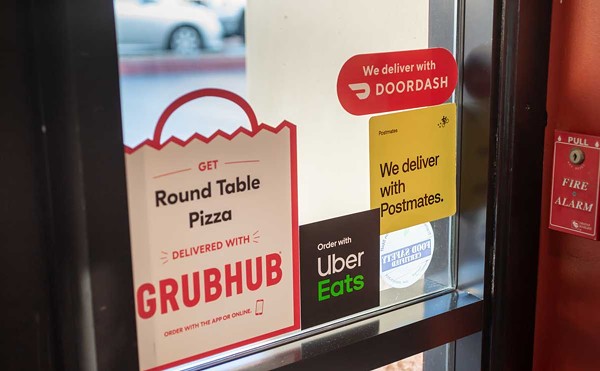Today, in restaurants everywhere, everything is sanitized, including their characters. Polished stainless steel cases, spotless tile floors, organization everywhere. No longer the chaos and clutter, or the unrefined sense that prevailed before the health department ordered that nothing be out of place. It mandated all the antiseptic cleansers that mask the aromas of bread baking, of corned beef and pastrami steaming, of pickles in open containers giving off the pungent, seductive scent of garlic. These and more melded with the smell of latkes and blintzes frying, of smoky lox as it was laid on bagels smeared with cream cheese, of chicken soup and mushroom barley simmering in stockpots.
Stanley Snitz, owner of Stan's Deli in Royal Oak, does what he can within the prevailing constraints to re-create the feel of golden age delis. And he does it well. The countermen are busy preparing trays for catering orders and rushing sandwiches out for individual orders, keeping the line moving. The place is small; only a handful of tables. There always seems to be a crowd waiting for a seat or a carryout order. It bustles, feels real. And a hot, tasty, grilled Reuben — on Stan's menu it's a No. 3, Big Ben's — costs only $8.25 compared to $19.95 at the venerable Carnegie Deli in New York (actually $23.95 if a splitting charge is added).
Metro Times chatted with Stan about the zeitgeist of the deli.
Metro Times: It seems you've been in the deli business your whole life, that you're one of the old-timers in it. When did it begin for you?
Stanley Snitz: I've been in the food business since '75; the deli business since '82.
MT: What makes the deli business special? What do you like about it?
Snitz: That we're mostly preparing everything fresh, from scratch. Ninety-two percent of everything we serve is made on the premises. I'm just proud, you know, that we're like an old ma-and-pa operation.
MT: You advertise that you are the only deli in town using fresh roast turkey ...
Snitz: Rotisserie roast. I remember not so much the delis in Detroit as the Tastee Barbeque on Livernois. The rotisserie lets some of the fat drip off and bastes the meat, giving it more flavor while keeping it a little healthier. We put a rub on the outside to bring out the flavor, and we use the best product that we could find — no preservatives, all white-meat breast. It can be dry, so we have to really watch it carefully to make sure that we can serve a moist product. It's a nice turkey. You'll have to try it.
MT: The mainstays of the deli industry are corned beef, pastrami and chicken soup, the same as it's been for decades. Now there's turkey pastrami, which is good too. Is there anything else new that's changed things in the deli business?
Snitz: Changed? Tuna. Tuna. Tuna. We're selling a ton of tuna. It's a mainstay like corned beef. Real pastrami sales have gone downhill, with turkey pastrami surpassing real pastrami. But, there's nothing that can really replace a hand-cut pastrami sandwich. I mean, our pastrami comes out of Brooklyn — Goldie.
When I opened this up, I wanted to make it an old-time deli. We have some vegetarian sandwiches for the upscale, health-conscious Birmingham and Royal Oak clientele. But on the whole, we have salamis hanging, the smell of pickles, just like the delis we remember from years ago, a traditional Jewish deli, kosher-style — not kosher. No disrespect intended, but some people call 7-Eleven a deli, probably because they sell sandwiches to go. It's just not the same.
MT: What's the difference between a Jewish deli and a plain old deli? Everyone who sells sandwiches or carryout foods refers to themselves as a deli today.
Snitz: I guess you can talk about an Italian deli or a Polish deli — Kowalski. Ours is still the Jewish tom, the taste. It's difficult to explain. It's the corned beef being cooked here, the pickles, the simmering soup, the fat dripping from the salamis. All of these aromas combine to give it a flavor that you recognize when you walk in the door. It just smells like a Jewish-style deli. There ain't nothing like it.
MT: What comes to mind when you think of the old delis of Detroit that were around when you were a kid?
Snitz: The old guys behind the counter. No one had gloves in those days, sawdust on the floor, stuff piled on top of the counter like New York. No one got sick back then. Those were the good old days. The guys behind the counter would joke with you while writing your order on a paper bag, which then became your bill if they weren't using the honor system where you told the cashier what was in the bag. It was a lot of fun
MT: What are some of the delis that you remember as favorites of Detroit's past?
Snitz: My dad used to take me to Modern on Fenkell, Billy's on Livernois, Samuels' in the Eastern Market, of course, Darby's, Jack Goldberg's famous Stage, the Esquire, Ben and George's. There were so many good delis in those days. It seems to have died out. I don't know if it's health reasons — Dr. Atkins. I don't know what it was. But we're now in a different area. We're getting back a lot of the old clientele. Jewish delis aren't just for Jews. Everyone likes a good corned beef sandwich.
MT: Why aren't there any delis in downtown Royal Oak?
Snitz: I'm not sure, but I think that in order to survive in Royal Oak, especially at night on the weekends, you need booze.
MT: What about downtown Detroit? The proliferation of office workers at the RenCen, Compuware and all of the other office buildings that are enjoying a resurgence would seem to offer a great opportunity for someone like you to be a part of the city's growth.
Snitz: I almost opened a deli in Compuware, more of a grocery-type deli, but I didn't see enough people on the streets, which means that a deli would have to survive on the business it could generate from 6 to 3, Monday through Friday. I couldn't afford, financially, to be a pioneer for a few years waiting for the payoff.
MT: Is the deli business going to stay alive? Are people like you going to keep it alive? Are there kids coming into the business who will be dedicated to the authenticity of the trade?
Snitz: I would hope that the Star and the Stage and Steve's and Alvin Winkler and Ronnie Forman and I can attract employees with dedication. We have to eliminate waste. Once in a while we overcook a corned beef or cook too much corned beef. You can only sell so much corned beef hash. Food cost is high in this business when you use the best products available. You can't cut corners on quality. And you can only charge so much.
MT: But it sounds like you're having fun.
Snitz: Yeah, we're having fun working hard trying to keep customers happy by serving them great food — a big sandwich at a reasonable price. It's fun when they appreciate it and come back for more. We're off to a good start since we opened in December.
MT: Have any tricks of the trade for home cooks?
Snitz: Come to Stan's Deli. Let us do it for you. We know what we're doing. We'll prove it. We love what we're doing.
32906 Woodward Ave., south of 14 Mile, Royal Oak; 248-549-3663
Jeff Broder, formerly the “Food Guy” for Metro Times, returns with this twice-monthly interview. Send comments to [email protected]




